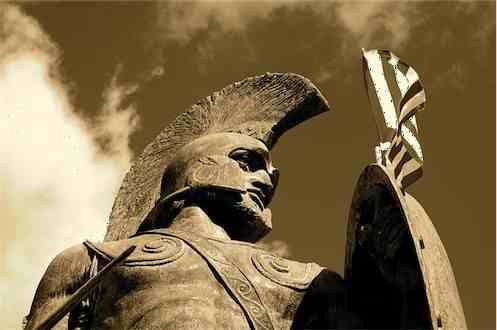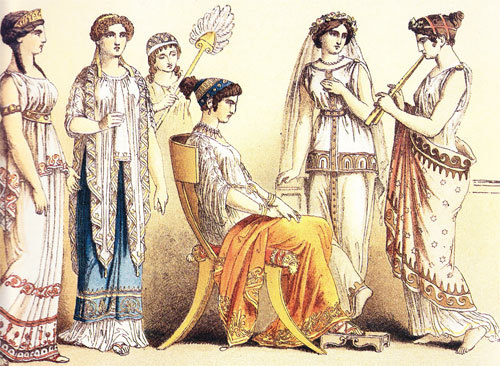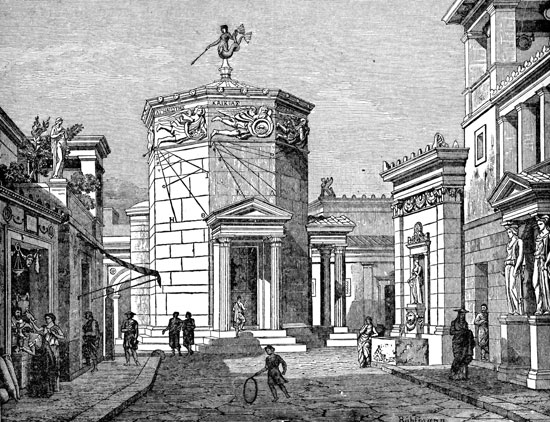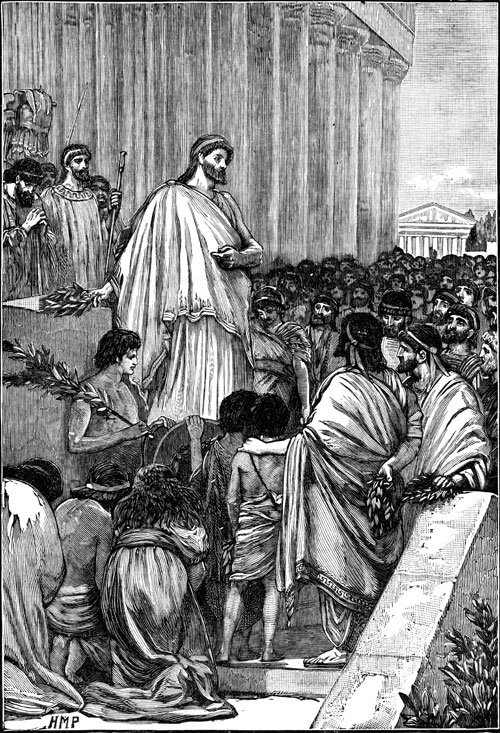The following is my abridgement of chapter 10 of William Pierce’s history of the white race, Who We Are:
Last Nordic Invasion of Greece
Precedes Rise of Classical Civilization
Dorians Brought Iron, New Blood to Greece
Athenian Democracy Led to Downfall

Greece was invaded by Greek-speaking Northerners several times during prehistory. Those who arrived in the period 2,100-1,900 B.C. founded the great Mycenaean civilization, which flourished from the end of the 16th century until about 1,200 B.C.
Homer, whose Iliad and Odyssey describe Mycenaean Greece, refers to the Greeks, or Hellenes, inclusively as “Achaeans.” In fact, however, the Achaeans were only one of the Hellenic tribes which were in Greece in Mycenaean times.
In addition to the Achaeans, who occupied most of the Peloponnesus (the southern peninsula of Greece, in which Mycenae was located), there were the Aeolians and the Ionians, who occupied other portions of the mainland, many of the Aegean islands, and the west coast of Asia Minor. The Ionians, in particular, settled in Attica and were the founders of Athens.
These tribal divisions apparently predate the arrival of the first Hellenes in Greece, and it seems likely that the Achaeans, Aeolians, and Ionians invaded the Aegean region separately, over a period of several centuries.
And there were also the non-Greek Pelasgians, the Mediterranean aborigines, who occupied the lowest stratum of Greek society and substantially outnumbered the Hellenes in Mycenaean times. As pointed out in the last installment, the Mycenaean Greeks were influenced culturally by these Mediterraneans—and, as time passed, racially as well.
In the late 14th and early 13th centuries B.C. more Greek-speaking Indo-Europeans arrived, coming westward across the Aegean in ships. They were Homer’s “divine born” heroes, the fathers and grandfathers of the warriors who sacked Troy about 1,250 B.C.: golden-haired Achilles, the sons of Atreus, and the other princes and kings of the Iliad. They settled in Greece, founded dynasties, and lived in a manner remarkably like that of northern Europe’s feudal lords more than twenty centuries later.
A couple of generations after the fall of Troy—exactly eighty years afterward, according to Greek tradition—a new group of divine-born warriors swept down on Greece, this time from the north. They were the Heraclidae, the supposed descendants of the blond demigod Hercules, and with them came the Dorians, the last of the major Hellenic tribes to reach the Aegean region.
The Dorians, who had settled in central Greece a few years earlier, proceeded to conquer the Achaeans, occupy the Peloponnesus, and extinguish Mycenaean civilization. But, in so doing, they prepared the way for the rise of a new civilization which would greatly surpass the old one. Displaced Achaeans, Aeolians, and Ionians migrated to new areas, sometimes displacing those people already there and sometimes amalgamating with them.
The Dorians were blonder than the Achaeans they conquered, but that is only because the Achaeans had been mixing with the Mediterranean aborigines for several centuries before the Dorians arrived; originally the two tribes had been of the same racial composition.
But the Achaeans were certainly more civilized than the rude, new arrivals from the north, and it was 400 years before Greece recovered from the cultural shock of the Dorian invasion.
Historians’ bias
The four centuries between the Dorian invasion and the flowering of the literate Classical civilization are referred to by most historians as “the Dark Age,” for much the same reasons that the period between the fall of Rome, more than fifteen centuries later, and the flowering of Mediaeval civilization is also called “the Dark Ages.”
In both cases a people of an older civilization, who had begun to succumb to racial mixing and decadence, was overwhelmed by a more vigorous and racially healthier but culturally less advanced people from the north. And in both cases a period of gestation took place over a dozen generations or so, during which a synthesis of old and new elements, racial and cultural, occurred, before a new and different civilization arose from the ruins of the old.
Unfortunately, most historians tacitly assume that the records of political and cultural activity which have come down to us from periods of civilized literacy provide all the data needed to yield an understanding of the historical process. The state of development and degree of organization and complexity of city life are taken as a yardstick by which to evaluate the significance or historical importance of a particular period. And if one’s standards of value are geared to such things as the volume of commerce, the gross national product, or even the intensity of scientific, literary, and artistic activity, such a yardstick may seem, at first glance, to be proper.
But there are other standards of value, such as those of the National Alliance, which differ somewhat from the customary ones. For it is not in the external forms of organization and activity of a people that we see the most important criteria for making a judgment as to the significance of a particular period, but rather in the actual racial constitution of a people and in the dynamic processes which, for better or worse, are influencing that racial constitution.
Although the basic racial constitution of a people is always intimately related to that people’s achievements in commerce, science, industry, art, politics, and warfare, still the two sets of criteria can lead to fundamentally different evaluations of a given historical period. This is a consequence of the fact that race building and decay are usually strongly out of phase with civilization building and decay.
Thus, the long ages between the periods of maximum civil activity—ages which the historian customarily ignores as being of only slight importance—may very well be periods of the greatest interest from a standpoint of racial dynamics.
It is, of course, true that the periods of maximum civil activity are precisely those which yield a maximum of written records, artifacts, and the other raw materials from which the historian builds his tale. But relative abundance of evidence should not be interpreted as equivalent to relative historical significance, regardless of the historian’s value criteria.
The record of the rise and fall of pure races constitutes the primary history of mankind, and the rise and fall of civilizations occupy a place of secondary importance. This statement may seem self-evident to those already accustomed to looking at history from a racial viewpoint, but it is by no means generally accepted by historians today. Until it is, much historical writing will continue to be flawed in a fundamental way.
 Sparta
Sparta
The Dorians of Laconia organized the Peloponnesian population in a three-layered hierarchy. At the top were the citizens of Sparta, the Spartiates, all of pure Dorian blood, ruled by their kings.
At the bottom of the social structure were the Helots, or serfs, consisting of the aboriginal Mediterranean elements as well as many of the conquered Achaeans of mixed blood. No Spartiate could engage in trade or practice a craft. The Perioeci handled all their commerce, and the Helots provided all their other needs.
Sparta thus had the only full-time, professional army in the Aegean world, and this fact gave her an influence vastly disproportionate to her numbers. So thoroughly did Sparta dominate all her neighbors, and so thoroughly feared and respected by all other Greeks for their military prowess were the Spartiates, that for more than 800 years the city had no need of walls or an acropolis, in marked contrast to every other Greek city of those times.
For another thing, the Spartiates gave an emphasis to racial fitness which went far beyond the needs of a strong and efficient army. Their eugenics program placed a premium on physical beauty—on aesthetic qualities, not just on raw strength or robustness. Spartan women, for example, were a far cry from the muscle-bound behemoths one sees on Soviet women’s Olympic teams these days; instead, they were judged by other Greeks to be among the most beautiful and graceful, as well as the fairest, of Hellenic women, rivaled in beauty only by the women of Thebes.
Another Spartan practice which suggests that racial rather than imperialistic motives may have been uppermost in the minds of their leaders was the regular thinning out of the Helot population, in what was known as the crypteia. This admirable institution sent teams of young Spartiates out into the countryside with daggers to dispatch Helots by the hundreds—an undertaking hardly consonant with a desire for as many subjects as possible, which is the norm for imperialists.
It is easy to imagine the Spartiates, upon their arrival in Laconia, surveying the moral decadence and the racemixing which had made the Achaeans such an easy conquest for the Dorians, and then instituting a carefully designed program to safeguard themselves from a similar fate. For a time this program succeeded; the moral character and the racial quality of the Spartiates remained famously high. But ultimately it failed in both regards.
As with other ruling classes at other times, the Spartiates did not produce enough children to make up for their losses in war. Even heavy penalties for celibacy and late marriage, and exemption from taxes for those Spartan families with four or more children, did not solve the problem.
At the beginning of the fifth century B.C. the Spartiates were able to field an army of 8,000 men against the Persians, but after the costly Spartan victory over Athens and her allies in the Peloponnesian War (431-404 B.C.) Spartan numbers declined rapidly. When the Spartiates marched against Thebes in 371 B.C., there were too few of them to prevail. After their decisive defeat by the Thebans at Leuctra, the Spartan army numbered only 2,000 warriors. A century and a half later there were only 700 of them, and they passed from the pages of history.
The Spartiates never succumbed to racemixing, but they did succumb to their own lifestyle. They would have been well advised to eliminate the Helots of the Peloponnesus and the Mediterranean population of Crete altogether and to establish a purely Dorian peasant class in those areas. Then they may well have been able to practice a successful eugenics program, maintain their moral health, and have a stable population too. But, of course, they did not have the advantage which hindsight gives us.
The other Hellenic tribes did succumb to racemixing. Their populations did not suffer the decline in numbers which the Spartiates did, but they suffered a decline in racial quality which resulted in their extermination, perhaps more slowly but just as surely—and less cleanly.
Athens
Athens was Sparta’s great political rival during much of the Classical Age. Athenian society came to be organized along quite different lines from Spartan society, but at the dawn of Greek history the similarities outweighed the differences.
The earliest Athenians were, like the other Hellenes, predominantly Nordic in blood and culture. Their social structure was aristocratic, and they were ruled originally by hereditary kings, just as in the case of the Spartiates.
In the seventh century there were two principal differences, from a racial viewpoint, between Sparta and Athens. The first difference, in favor of Sparta, was a culturally and racially more homogeneous class of citizens in Sparta than in Athens. The second was that Athens had a free citizen-peasantry—a decided plus for her.
By the beginning of the sixth century, however, the Athenian peasants were in danger of losing their freedom, many of them having already been sold into slavery and others being effectively chained by indebtedness.
The social unrest resulting from this situation led the Athenians to give absolute power to Solon, a nobleman, in the hope that he could improve things. Solon gave Athens a constitution which wrought a number of changes with long-lasting effects, some good and some bad. On the positive side, he outlawed the practice of enslavement for indebtedness. But he also took the decisive step of transferring the power of the Athenian state from the hands of the aristocracy into the hands of a plutocracy.
Although this latter change was only de jure at first, since the aristocrats were also the plutocrats, it shifted the ultimate criterion of fitness to rule from blood to gold. Henceforth, any sufficiently wealthy speculator who had acquired enough land to yield the specified amount of agricultural produce could theoretically qualify for the highest office in the state and for membership in the Council of the Areopagus: the highest judicial body in Athens, made up of nobles who had formerly held the office of archon, or ruler.
Race-Based Citizenry. Even after Solon, however, democracy did not devour the Athenians all at once. Solon and the tyrants who gained power shortly after his administration, the Peisistratids, governed an Athens in which citizenship was still a racial matter, being based on membership in one of the kinship groups, or clans, which made up the Hellenic tribes of Attica.
In 509 B.C., 85 years after the beginning of Solon’s administration, another “reformer,” Cleisthenes, took office, and he undertook a program of gerrymandering which laid the basis for changing citizenship from a racial to a geographic affair. From this point it was downhill all the way for Athens, racially speaking.
Half a century later the last remnants of power were transferred from the Areopagus to a popular council. All the abuses of mass party politics with which Americans are all too familiar were thenceforth the lot of the Athenians.
Law of Pericles. As the prosperity of Athens grew, more and more foreigners crowded into Attica, with intermarriage inevitably occurring. A temporary halt to the pollution of the Athenian citizenry by the offspring of aliens came in 451 B.C., when the great Pericles pushed through a law restricting citizenship to those born of an Athenian father and an Athenian mother. Only four decades later, however, in order to make up the enormous losses suffered in the Peloponnesian War, Athens bestowed citizenship on tens of thousands of foreigners.
And in the fourth century, although the citizenship law of Pericles remained on the books, every variety of Levantine mongrel was claiming Athenian citizenship. The banking industry of Athens, for example, was entirely in the hands of Semites, who had taken Greek names and were awarded citizenship for “service to the state,” much in the way Jews and Negroes have been elevated to the British “nobility” by the score in recent decades.
Darkening of Hellas. Intermarriage was rife, and the darkening of the Hellenes of Athens was well under way. Racial, moral, and cultural decline went hand in hand. The second-century historian Polybius described his countrymen as “degenerate, pleasure-seeking beggars, without loyalty or belief, and without hope for a better future.”
A century later, in the reign of Augustus, the Roman writer Manilius reckoned the Hellenes among the dark nations (coloratae genies). And so the Athenians, like the Spartiates, passed from the pages of history.
Extermination or expulsion
If it is difficult to believe that as great a state as Athens could pass from Nordic genius and glory to mongrelized squalor in a few centuries, just think for a moment of the racial transformation of America which has taken place in a single century. And imagine what America will be like two or three centuries hence (barring a White revolution), when Whites are a minority, outnumbered by both Blacks and Chicanos. America’s technology and industry may coast along for a century or two on the momentum acquired from earlier generations, as Athens’ culture did, but the American people—the real Americans—will have passed from the pages of history.
The passing of the Hellenes must be regarded as one of the greatest tragedies of our race. A great-hearted and noble people, filled with genius and energy, they seized upon the resources in labor, material, and land which their conquest of the conservative Mediterranean world offered, and they wrought one of the most progressive civilizations this earth has yet seen. Indeed, many of their creations remain unsurpassed to this day.
This catastrophic mixing of bloods has occurred over and over again in the history and prehistory of our race, and each time it has been lethal. The knowledge of this has been with us a long time, but it has always failed us in the end. The Hellenes of Sparta and Athens both strove to keep their blood pure, but both ultimately perished. The only way they could have survived would have been to eliminate the entire indigenous population, either through expulsion or extermination, from the areas of the Mediterranean world in which they settled.
The Hellenes always possessed a certain feeling of racial unity, distinguishing themselves sharply from all those not of their blood, but this racial feeling was, unfortunately, usually overshadowed by intraracial conflicts. The rivalries between Hellenic city-states were so fierce and so pervasive, that the Mediterranean natives were more often looked upon as a resource to be used against other Hellenes than as a biological menace to be eliminated.






